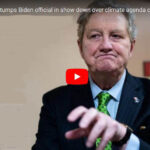De komende aardverschuiving in het Amerikaanse klimaatbeleid, waarover wij hier op Climate.nl uitvoerig hebben bericht (zie hier, hier, hier en hier), is nog nauwelijks op de radar van de mainstream media gesignaleerd. Maar daarvoor hebben we dan ook de sociale media!
Dat geldt eens te meer voor het kleine aardverschuivinkje dat de EU aan het voorbereiden is. Het staat weliswaar los van de uitkomst van de Amerikaanse presidentsverkiezingen, die een totale ontmanteling van het klimaatbeleid beloven, maar het past in een bredere ontwikkeling, waarbij het, nu het steeds meer pijn begint te doen, zelfs bij de EU-landen gaat dagen dat het beleid te ver is doorgeschoten.
Onder de titel, ‘Renewables could lose European power grid priority, documents reveal’, schreef Arthur Neslen voor ‘The Guardian’.
Industry concern after confidential impact assessment models scenarios for paring back the ‘priority dispatch’ system for clean energy.
Windfarms and solar power could soon lose the privilege of getting priority over other energy sources on European electricity grids, leaked documents show.
Paring back the “priority dispatch” system could increase carbon emissions by up to 10%, according to a confidential EU impact assessment seen by the Guardian. But the document goes on to model four scenarios for doing just that, in a bid to make Europe’s energy generators more flexible and cost-competitive.
Some industry sources have told the Guardian they are alarmed and think it highly likely that priority dispatch for clean energy will be scrapped from the EU’s renewable energy directive, which is currently being redrafted for the post-2020 period.
Oliver Joy, a spokesman for the WindEurope trade association, said: “Removing priority dispatch for renewable energies would be detrimental to the wind sector, which would face more curtailment across the continent. It also seems to be at odds with Europe’s plans to decarbonise and increase renewables penetration over the next decade.”
“Investors took priority dispatch into account when projecting revenues in the original investment decisions, and it could have a bearing on existing projects if they are not protected from the change.” …
Senior industry sources say they will push for financial compensation and access to balancing markets to help prevent a significant industry contraction, if priority dispatch is ended. …
The EU’s assessment views the abolishing of priority dispatch as a step towards the creation of a “level playing field” for energy generators.
But without such a system, renewable sources may be the most likely to be taken offline because of the relative ease of switching off a wind turbine compared to a coal or nuclear plant.
The energy source with the lowest marginal cost – almost always renewables – is usually the first in line to be shut down by power grid operators.
As things are, a Europe-wide trend towards ending financial support has constrained the forward march of renewables on the continent, and siphoned off investment to elsewhere in the world.
“Everyone is investing in renewables outside Europe right now,” said one industry source. “If you want to bring investors back you have to send very relevant signals.” …
The four scenarios for scaling back priority dispatch involve an increase in CO2 emissions of 45m-60m tonnes.
Lees verder hier.
Hoe ook zij, het lijkt erop dat investeerders in windenergie het moeilijker zullen krijgen, vanwege het feit dat hun verdienmodel onder druk zal komen te staan.
Voor mijn eerdere bijdragen over klimaat en aanverwante zaken zie hier, hier, hier, hier en hier.






Welke ‘industry sources’ zouden er nu toch zo gealarmeerd kunnen zijn? ;)
Waarom niet gewoon man en paard noemen?
Dat zal denk ik de eerste breuk in de dam zijn en mogelijk een paradigmaverschuiving door gezonde ratio. We kunnen vast weer het nodige lawaai verwachten bijvoorbeeld dat wij wereldwijd toch echt de resultaten beginnen te merken van al dat moois waardoor windmolens en zonnepanelen onze planeet in het aards paradijs gaan veranderen. Vandaag was dat al het geval en een paar dagen eerder ook. Wereldwijd is in 2015 de emissie met 0,1% gestegen. De stijging in de EU was 1,3%. China had -0,1%, Nederland 3,2%, Duitsland 0,8%. De CIS-landen maakten een flinke klapper door het vervangen van oude gore fabrieken voor modernere en schonere. Brazilië -3,9% omdat ook daar de economische groei stagneert. US -2,6% mede door schaliegas. Het is dus een breed scala aan oorzaken. Daarnaast is het wel zo verstandig te kijken naar het ‘gewicht’ en dan zie dat China en de US fors gewicht in de schaal werpen. Met deze gegevens is het wel erg voorbarig om het succes van klimaatbeleid te claimen. Tja, het zal vast een boeiend propaganda-offensief worden van klimatofielen. (statistical workbook BP)
http://www.bp.com/en/global/corporate/energy-economics/statistical-review-of-world-energy/downloads.html
@hetzler. ‘een paradigma verschuiving naar de gezonde ratio’. De gezonde ‘ratio’ is goedkope energie die economische ‘groei’ met zich meebrengt. In 1978 maakte ik een docu met de titel 10.ooo megawatt. Dat was op dat moment het opgestelde vermogen in Nederland
Dertig jaar later was dat verdrievoudigd naar 30.000 megawatt. Economische groei veronderstelt dus kort door de bocht een enorme toename van de ‘consumptieve’! vraag naar energie.
Hoe verklaart u eigenlijk dat het laatste decennium die consumptieve vraag wel toeneemt maar lang niet in die mate zoals dat ‘wenselijk’ is om de ‘gezonde ratio’ en ‘economische welvaart’ wereldwijd significant te laten toenemen?
@Hetzler
Het gros van uw betogen gaan over de zinloosheid van de ‘subsidies’ die er in uw ogen verspild worden aan ‘renewables’. U kunt zich daar flink over opwinden.
De ratio waarop uw lijkt te doelen, schijnt dus te zijn de economische malheur die mogelijkerwijs ontstaat of zou kunnen ontstaan door het ontbreken van de ‘ratio’ .
De ‘zonde van het geld ratio’ gebaseerd op de wetten van de thermodynamica en reeele kosten van energie ‘what so ever’.
Nou dat kan allemaal wel zo zijn en ondanks allerlei technologische ontwikkelingen en kostenreducties geef ik u graag gelijk, het kan me verder weinig schelen
Dat gelijk heeft in mijn optiek weinig betekenis…..net zoals trouwens de diskussie of de aarde nu wel of niet opwarmt tgv het AWG.
Die opwarming of niet gaat toch wel door of niet en als gevolg waarvan….???tja dat zal wel lang een punt van diskussie blijven! Dat is een kwestie van al naar gelang je standpunt naar willekeur grabbelen in de ‘wetenschaps ton’.
Dat vind ik ook erg leuk aan uw site…het is grabbelen in de wetenschaps-ton, met alle gewicht die daaraan kan worden meegegeven. Objectiviteit…paradigma…gemanipuleerde meetgegevens…afijn noem maar op.
Uw schijnt ‘scepticus’ te zijn, toch zijn uw betogen nogal stellig en laten weinig ruimte voor twijfel van welke aard dan ook. Nou ja wat doet het er toe.
Zoals Jaffe Vink een oude studiegenoot al aangaf…we hebben nou een keer de ‘ondergangsgedachte’ nodig en uw site staat bol van de rampspoed ideeen.
Ik vind beide posities getuigen van een zelfde soort ‘doemdenken’ ,de een verwijt de ander dat we ‘in de middeleeuwen’ terecht zullen komen. Nou dat zal links of rechts om dus ook wel gebeuren denk ik dan. Want als iedereen hetzelfde beweert….
Maar goed u verwacht kennelijk dat als de ‘ratio’ weer vat krijgt op het debat de zaken wel ten goed zullen keren.
Dat ten goede keren wordt op uw site een en ander maal gekoppeld aan het inzicht dat fossiele energie de ultieme voorwaarde is voor economische verbetering en vooruitgang.
Nou ook daar heb ik weinig tegen in te brengen. ‘Weinig’ is echter niet ‘niks’.
De vraag is bij welke energieprijs stokt de ‘economische vooruitgang’. Want één ding is duidelijk er is een direct verband tussen ‘goedkope energie’ en ‘economische vooruitgang’. Was die ‘ratio’ er niet dan zou u zich niet zo druk maken over al die subsidies.
Maar ja wat is goedkoop? en waar houdt goedkoop op om nog economische groei te kunnen bewerkstelligen. In mijn stellige overtuiging is die grens van betaalbaar, goedkoop en groeibevorderend voor een snel groeiende wereldbevolking allang overschreden.
Uw bijdrage over eroi en die van anderen op uw site gaan volstrekt voorbij aan de economische draagkracht en groeipotentieel buiten de ‘oilrig’ mm.
Ze bewegen zich slechts binnen het ‘paradigma’ van rentabiliteit van de winning van energie ‘an sich’. Tja… Dat is in mijn optiek een fundamentele vergissing die telkens maar weer tot geen enkel inzicht leidt. Slechts tot opwinding over subsidies!
Waar liggen nu werkelijk de grenzen van de relatie tussen groei en energieprijzen…?
Daar ging mijn vraag over, die u kennelijk niet begrepen schijnt te hebben.
Wellicht omdat u binnen het energie paradigma blijft hangen en niet wilt of kunt zien hoe de economische wereld werkelijk afhankelijk is van de energiekosten. U denkt slechts in termen van goedkoper dan….maar ja zelf goedkoop kan onbetaalbaar zijn.
Laten we zeggen ergens zij ergens bij 20 dollar per vat equivalent zou moeten liggen. Interessant is dat als u die lat zou hanteren u zou zien dat daarna de economische groei feitelijk alleen maar is toegenomen door het oneindig oprekken van de ‘schulden’ aangegaan door staten en individuen. En da is wat wenu precies gaan zien bij het aantreden van de regering Trump.
En daar geachte heer Hetzler ligt de crux van de relatie tussen economische groei en energie…..
En dus maakt het allemaal weinig uit welke (subsidie) berekening u loslaat op de energie voorziening.
Hier geldt dezelfde wet als bij de berekening van de bijdrage die over de bijdrages aan de CO2 reductie gaan.
Ze zijn irrelevant tov de basis vraag….hoe duur mag energie zijn om economische vooruitgang mogelijk te maken?
Wellicht dat u daar een gedacht over heeft ? Tegelijkertijd ben ik erg tevreden over uw site. Ik ben altijd al geinteresseerd geweest in maat/weten/schappelijke grabbeltonnen
Met vriendelijke groet.
Ook een mooi artikel
http://www.wijwordenwakker.org/content.asp?m=m26&s=M68&ss=P2431&l=NL
Volgens dit blog van de heer H.Labohm lijkt het erop
dat de realiteit door breekt. In Nederland is nu nog het
plan om een grotere capaciteit aan windvermogen te
instaleren dan het nachtelijk stroomverbruik van het
Nederlandse net. Als dat niet opgeslagen of uitgevoerd
kan worden is een deel van die energie onbruikbaar,
dus zal een deel van die windmolens afgeschakeld moeten
worden, dus niks geen voorrang op het net.
In verband met een betrouwbare overheid en de SDE+
regeling zal er dus subsidie verleend moeten worden
aan de eigenaren van die afgeschakelde windmolens.
Met recht een malle molen.
@Olivat ik heb geschreven: ‘paradigmaverschuiving door gezonde ratio’ niet naar gezonde ratio. Met ratio is hier bedoel: de rede, gezond verstand. Met economische verhoudingen heeft het in die tekst dus niets maken. Als u zo vriendelijk zou willen zijn om zelf een rekensommetje te maken van wat u zelf precies wilt betogen met uw definitie van ratio.
@Hetzler
Het gros van uw betogen gaan over de zinloosheid van de ‘subsidies’ die er in uw ogen verspild worden aan ‘renewables’. U kunt zich daar flink over opwinden.
De ratio waarop uw lijkt te doelen, schijnt dus te zijn de economische malheur die mogelijkerwijs ontstaat of zou kunnen ontstaan door het ontbreken van de ‘ratio’ .
De ‘zonde van het geld ratio’ gebaseerd op de wetten van de thermodynamica en reeele kosten van energie ‘what so ever’.
Nou dat kan allemaal wel zo zijn en ondanks allerlei technologische ontwikkelingen en kostenreducties geef ik u graag gelijk, het kan me verder weinig schelen
Dat gelijk heeft in mijn optiek weinig betekenis…..net zoals trouwens de diskussie of de aarde nu wel of niet opwarmt tgv het AWG.
Die opwarming of niet gaat toch wel door of niet en als gevolg waarvan….???tja dat zal wel lang een punt van diskussie blijven! Dat is een kwestie van al naar gelang je standpunt naar willekeur grabbelen in de ‘wetenschaps ton’.
Dat vind ik ook erg leuk aan uw site…het is grabbelen in de wetenschaps-ton, met alle gewicht die daaraan kan worden meegegeven. Objectiviteit…paradigma…gemanipuleerde meetgegevens…afijn noem maar op.
Uw schijnt ‘scepticus’ te zijn, toch zijn uw betogen nogal stellig en laten weinig ruimte voor twijfel van welke aard dan ook. Nou ja wat doet het er toe.
Zoals Jaffe Vink een oude studiegenoot al aangaf…we hebben nou een keer de ‘ondergangsgedachte’ nodig en uw site staat bol van de rampspoed ideeen.
Ik vind beide posities getuigen van een zelfde soort ‘doemdenken’ ,de een verwijt de ander dat we ‘in de middeleeuwen’ terecht zullen komen. Nou dat zal links of rechts om dus ook wel gebeuren denk ik dan. Want als iedereen hetzelfde beweert….
Maar goed u verwacht kennelijk dat als de ‘ratio’ weer vat krijgt op het debat de zaken wel ten goed zullen keren.
Dat ten goede keren wordt op uw site een en ander maal gekoppeld aan het inzicht dat fossiele
Zelfs als ik mijn antwoord in tweeen knip kom ik er niet door…lijkt me niet in overstemming met de netiquettes van uw site.
@Hetzler
Het gros van uw betogen gaan over de zinloosheid van de ‘subsidies’ die er in uw ogen verspild worden aan ‘renewables’. U kunt zich daar flink over opwinden.
De ratio waarop uw lijkt te doelen, schijnt dus te zijn de economische malheur die mogelijkerwijs ontstaat of zou kunnen ontstaan door het ontbreken van de ‘ratio’ .
De ‘zonde van het geld ratio’ gebaseerd op de wetten van de thermodynamica en reeele kosten van energie ‘what so ever’.
Nou dat kan allemaal wel zo zijn en ondanks allerlei technologische ontwikkelingen en kostenreducties geef ik u graag gelijk, het kan me verder weinig schelen
Dat gelijk heeft in mijn optiek weinig betekenis…..net zoals trouwens de diskussie of de aarde nu wel of niet opwarmt tgv het AWG.
Die opwarming of niet gaat toch wel door of niet en als gevolg waarvan….???tja dat zal wel lang een punt van diskussie blijven! Dat is een kwestie van al naar gelang je standpunt naar willekeur grabbelen in de ‘wetenschaps ton’.
Dat vind ik ook erg leuk aan uw site…het is grabbelen in de wetenschaps-ton, met alle gewicht die daaraan kan worden meegegeven. Objectiviteit…paradigma…gemanipuleerde meetgegevens…afijn noem maar op.
Uw schijnt ‘scepticus’ te zijn, toch zijn uw betogen nogal stellig en laten weinig ruimte voor twijfel van welke aard dan ook. Nou ja wat doet het er toe.
Zoals Jaffe Vink een oude studiegenoot al aangaf…we hebben nou een keer de ‘ondergangsgedachte’ nodig en uw site staat bol van de rampspoed ideeen.
Ik vind beide posities getuigen van een zelfde soort ‘doemdenken’ ,de een verwijt de ander dat we ‘in de middeleeuwen’ terecht zullen komen. Nou dat zal links of rechts om dus ook wel gebeuren denk ik dan. Want als iedereen hetzelfde beweert….
Maar goed u verwacht kennelijk dat als de ‘ratio’ weer vat krijgt op het debat de zaken wel ten goed zullen keren.
Dat ten goede keren wordt op uw site een en ander maal gekoppeld aan het inzicht dat fossiele energie de ultieme voorwaarde is voor economische verbetering en vooruitgang.
Nou ook daar heb ik weinig tegen in te brengen. ‘Weinig’ is echter niet ‘niks’.
@hetzler ik heb een uitgebreid antwoord geschreven op uw vraag aan mij…maar het wordt niet geplaatst, terwijl er geen onvertogen woord valt….hoe komt dat?
Dat vind ik ook erg leuk aan uw site…het is grabbelen in de wetenschaps-ton, met alle gewicht die daaraan kan worden meegegeven. Objectiviteit…paradigma…gemanipuleerde meetgegevens…afijn noem maar op.
Uw schijnt ‘scepticus’ te zijn, toch zijn uw betogen nogal stellig en laten weinig ruimte voor twijfel van welke aard dan ook. Nou ja wat doet het er toe.
Zoals Jaffe Vink een oude studiegenoot al aangaf…we hebben nou een keer de ‘ondergangsgedachte’ nodig en uw site staat bol van de rampspoed ideeen.
Ik vind beide posities getuigen van een zelfde soort ‘doemdenken’ ,de een verwijt de ander dat we ‘in de middeleeuwen’ terecht zullen komen. Nou dat zal links of rechts om dus ook wel gebeuren denk ik dan. Want als iedereen hetzelfde beweert….
Maar goed u verwacht kennelijk dat als de ‘ratio’ weer vat krijgt op het debat de zaken wel ten goed zullen keren.
Dat ten goede keren wordt op uw site een en ander maal gekoppeld aan het inzicht dat fossiele energie de ultieme voorwaarde is voor economische verbetering en vooruitgang.
Nou ook daar heb ik weinig tegen in te brengen. ‘Weinig’ is echter niet ‘niks’.